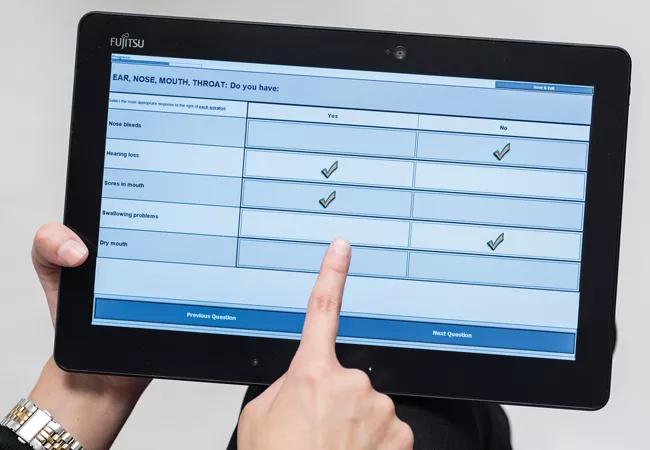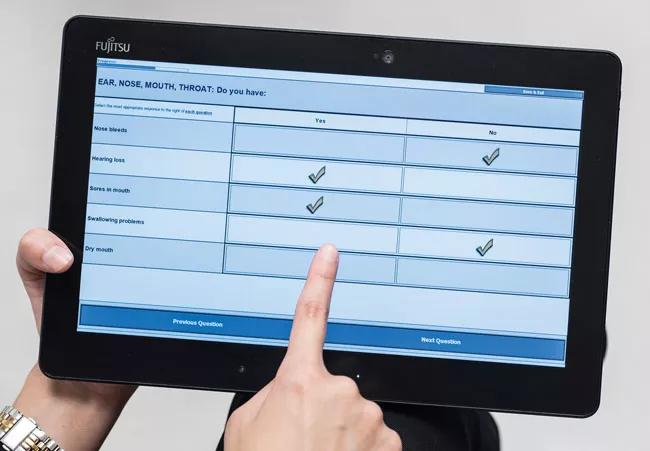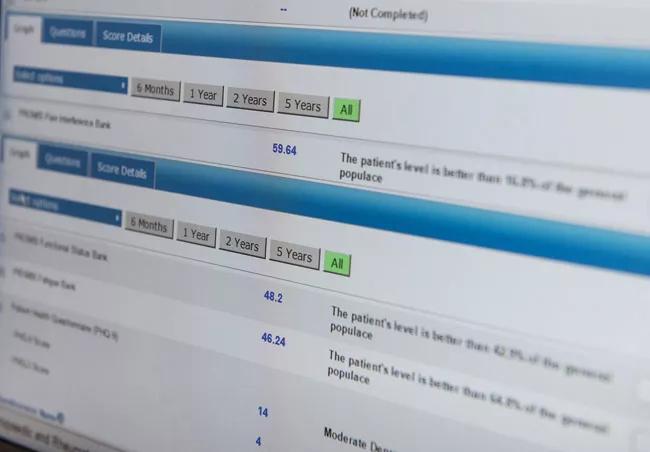MyRheum obtains whole-patient view

Image content: This image is available to view online.
View image online (https://assets.clevelandclinic.org/transform/abc0f5a9-ce05-4604-ad2d-33282c5b6e1b/16-RHE-2508-Abelson-ConsultQD_650x450_jpg)
16-RHE-2508 Abelson ConsultQD_650x450
Functional status and disease activity are important metrics for evaluating whether patients require and are responding to treatment for rheumatic diseases. Physicians do this in the office every day with history and exam but without objective, validated measures that can reliably assess and track patient progress over time.
Advertisement
Cleveland Clinic is a non-profit academic medical center. Advertising on our site helps support our mission. We do not endorse non-Cleveland Clinic products or services. Policy
A new tool using a tablet computer and validated outcome measures has been initiated at Cleveland Clinic. It enables rheumatologists to obtain the information they need to make informed treatment decisions in real time and before they enter the patient’s room.
The proprietary program, called MyRheum, allows patients to answer questions using validated outcome measures such as PROMIS® (Patient Reported Outcomes Measurement Information System) and RAPID3 (Routine Assessment of Patient Index Data) either on a tablet in the waiting room or at home on MyChart, a secure website that is part of the Epic electronic medical record.
The questions allow the assessment of global measures of physical and mental health and domains of pain, fatigue and physical function using PROMIS, and a measure of disease activity for rheumatoid arthritis patients using RAPID3. Patients also fill out a complete review of systems.
“Ordinarily, asking so many questions would be too time-consuming, but computer- assisted technology makes it very fast,” says Abby Abelson, MD, FACR, Chair of the Department of Rheumatic and Immunologic Diseases. “The answers help us manage patients better.”
Creating a better way
MyRheum is a collaboration of a multidisciplinary team from Epic, Neurology, Rheumatology and IT at Cleveland Clinic. Dr. Abelson and Chad Deal, MD, Head of the Center for Osteoporosis and Metabolic Bone Disease, have led the efforts in Rheumatology.
“The old way of following patients was to tell them to continue their current therapy if they said, ‘I feel well.’ We were not basing our assessment on data but on ‘gestalt.’ How did we really know they were doing well?” Dr. Abelson asks. “We recognized the importance of incorporating patient-centered and patient-entered data in following patients with chronic rheumatologic diseases. We also recognized the need to utilize validated disease activity scores to follow changes and make decisions about therapy at the point of care.”
Advertisement
They took their concept to Cleveland Clinic’s Clinical Transformation team. The team created the tool for Rheumatology using an existing program developed by Cleveland Clinic neurologist Irene Katzan, MD, MS, called the Knowledge Project (KP), which allows collection of patient data on an electronic tablet. The technology has been employed in multiple settings throughout the institution.
Conversations about MyRheum started in May 2016. In only three months, it was rolled out on main campus. It will be made available to rheumatology patients at every Cleveland Clinic location before the end of 2016.
When an appointment with a Cleveland Clinic rheumatologist is scheduled, the patient is sent an electronic reminder to complete the questionnaire. The patient can log on to MyChart or use a tablet in the waiting room at the time of their appointment in order to complete it.

Image content: This image is available to view online.
View image online (https://assets.clevelandclinic.org/transform/dac4692d-81c9-4b81-9831-e09401bb6060/16-RHE-2508-Abelson-ConsultQD_Inset-1_jpg)
Patient completes PROMIS on a tablet in the waiting room
In addition to providing a complete review of systems, the questions generate an assessment of disease activity using RAPID3 in rheumatoid arthritis patients and PROMIS which gauges physical, mental and social health as well as the important domains of pain, functional status and fatigue.
PROMIS began as an NIH-funded program that measured domains of health in thousands of people and established norms that serve as comparators. In a specialty like rheumatology where function is important, PROMIS can reveal whether a patient is doing better or worse than validated norms for the population.
Advertisement
After all questions have been answered, MyRheum calculates scores and posts the answers to individual questions as well as overall scores in KP and in the patient’s medical record. The physician simply opens Epic, goes to KP and views the latest data, and can then compare it with prior assessments. A program in Epic called Synopsis allows the scores to be graphed, adding lab tests such as ESR and CRP, and medications, to display how the patient is responding to treatment.

Image content: This image is available to view online.
View image online (https://assets.clevelandclinic.org/transform/837e6d35-3319-4148-b822-0dd5c6d7cf92/16-RHE-2508-Abelson-ConsultQD_Inset-2_jpg)
KP displays assessment data with options for longitudinal and comparative views.
“Comparing where patients are now to where they were at the last visit makes us nimble in changing therapy right away,” says Dr. Abelson. “If a patient is on a medication, and I see function scores are down and pain scores are up before I enter the exam room, I know the patient is not doing as well as last time, and we need to talk about changing meds.
“The process makes appointments more efficient and patient-centered, but not shorter. Rather, the time is used differently. Instead of typing answers, we can look at labs and make decisions. We can also talk about quality-of-life issues such as fatigue and depression, because the patient’s responses allow us to look at the whole patient, not just disease activity.”
So far, MyRheum has surpassed expectations. “It is working very well, and we are very pleased,” says Dr. Deal. Both rheumatologists feel that using standardized disease-scoring systems is the right approach to ensuring optimal patient care.
Advertisement
Even though the system is likely to enhance compliance with Medicare regulations, its creators emphasize that it was developed solely to improve management at the point of care.
“We did it because it’s the right thing to do for patients, the right way to follow them and give them the best care,” says Dr. Abelson.
Advertisement
Advertisement
Researching the biological basis for why treatment is or is not effective
Scribing system helps create more face-to-face interactions
A conversation with Leonard Calabrese, DO
The case for continued vigilance, counseling and antivirals
High fevers, diffuse rashes pointed to an unexpected diagnosis
No-cost learning and CME credit are part of this webcast series
Summit broadens understanding of new therapies and disease management
Program empowers users with PsA to take charge of their mental well being